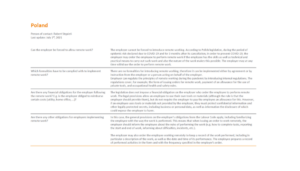The government announced an extension of the “Poland. Business Harbour” program. In addition to Belarus, now specialists from Armenia, Georgia, Moldova, Russia and Ukraine will be able to apply for visas under the program.
Visa facilitation for new countries (other than Belarus) is offered generally to foreigners invited by employers who apply to participate in the program. The program is currently targeted primarily at the broader IT sector. In addition to the ability to obtain a one-year visa after prioritized process, foreign nationals receive two important benefits: an ability to work without a work permit and facilitation in entry in Poland.
Holders of visas with the annotation “Poland. Business Harbour” are exempt from a requirement to hold a work permit during validity of the visa. However, the regulations still contain a loophole that may prevent legal performance of work after the visa expires and before obtaining an appropriate residence permit in Poland.
Visas under the program are also issued to spouses and children of employees. This is a significant facilitation for families of employees. Family members are automatically granted the right to enter Poland on an equal basis with employees (due to restrictions on entry to Poland related to the coronavirus pandemic). However, families of professionals from e.g. Ukraine who obtain visas with the endorsement “Poland. Business Harbour”, will be entitled to enter Poland without further demonstration of their status or approval of the Border Guard. Upon arrival in Poland, however, they may be required to undergo quarantine, just like the employees themselves.
According to government announcements, the program may be expanded to other countries and industries in the future. The decision will depend on the results of the current round of program expansion.


